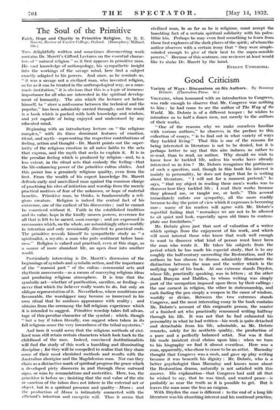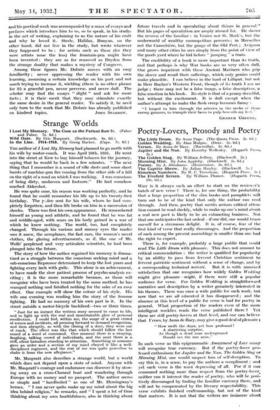Good Criticism
Variety of Ways : Discussions on Six Authors. By Bonamy Dobrcle. (Clarendon Press. Os.)
VOLTAIRE, when honoured with an introduction to Congreve, was rude enough to observe that Mr. Congreve was nothing to him : he had come to see the author of The Way of the World. Mr. Dobree is of a different temper : he wishes to introduce UN to half a dozen men, not merely to the authors of their works.
'One of the reasons why we make ourselves familiar with various authors," he observes in the preface to this collection of essays, "is to find out in what variety of ways they tackled living." That this is one of the reasons for being interested in literature is not to be denied, but it is perhaps better to say that this aim induces us rather to re-read, than to read, an author. Why should we wish to know how he tackled life, unless his works have already interested us in hint? Mr. Dobree recognizes the pertinence of such a question, and, though in this book his interest is mainly in personality, he does not forget that he is writing about literature. "I will not for a moment pretend," he says, "that my object in reading these men's works was to discover how they tackled life ; I read their works because they pleased me, or taught me, or both." This avowal immediately enlists our sympathy, all the more readily because to-day the point of view which it expresses is becoming rare ; many of his readers will agree with Mr. Dobree's regretful feeling that "nowadays we arc not to be allowed to sit quiet and look, especially upon old times to contem- plate our forefathers."
Mr. Doty& gives just that sort of valuation of a writer which springs from the enjoyment of his work, and which will most interest those who know that work well enough to want to discover what kind of person must have been the man who wrote it. Ile takes his subjects from the period which he has made his especial study, that is to say roughly the half-century succeeding the Restoration, and the authors he has chosen to discuss admirably illuminate the distinction between the man and the writer which is the unifying topic of his book. At one extreme stands Dryden, whose life, practically speaking, was in letters ; at the other stand Bunyan and Halifax, to whom writing was simply part of the occupation imposed upon them by their callings: the one earnest in religion, the other in statesmanship, and each finding the pen simply a weapon in the cause of wisdom, worldly or divine. Between the two extremes stands Congreve, and the most interesting essay in the book contains Mr. Dobree's account of this enigmatic person, the master of a finished art who practically renounced writing halfway through his life. It was not that he had exhausted his personality in what he had written—his work is quite detached and detachable from his life, admirable, as Mr. Dobree remarks, solely for its aesthetic quality, the production of a pure and a perfectly balanced artist. Nor was it that life made insistent rival claims upon him : when we turn to his biography we find it almost everttless. Here was a man, apparently, who chose to cease to be an artist. Macaulay thought that Congreve was a snob, and gave up play writing because it was beneath his dignity : Mr. Dobree, who is a better psychologist than Macaulay and knows more about the Restoration drama, naturally is not satisfied with this answer. His explanation—that Congreve had said all that he wished to say, that he was tired, and wanted peace--is probably as near the truth as it is possible to get. But it leaves the man none the less an enigma.
With Dryden the case is different : to the end of a long life literature was his absorbing interest and his continual practice, and his poetical work was accompanied by a mass of essays and prefaces which introduce him to us, so to speak, in his study, in the act of writing, explaining to us the nature of his craft and why he loved it. Steele, Halifax, Bunyan, on the other hand, did not live in the study, but wrote wherever they happened to be : for artists such as these (for they were artists none the less) the fountain-pen might have been invented : they are as far removed as Dryden from the strange duality that makes a mystery of Congreve.
Among these figures Mr. Dobree moves with an easy familiarity ; never oppressing the reader with his own learning, assuming a certain knowledge on his part and not much trying to increase it, wielding (there is no other phrase for it) a graceful pen, never perverse, and never dull. The scholar may find the essays " slight " and ask for more facts ; it is their • merit • that they may stimulate exactly the same desire in the general reader. To satisfy it, he need only turn to the work that Mr. Dobree has already published





































 Previous page
Previous page